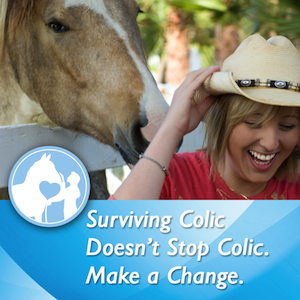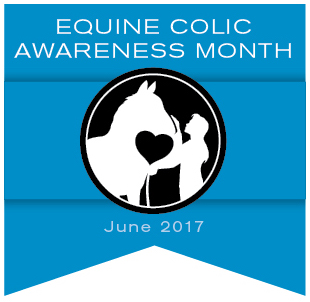 2013 Equine Colic Awareness Month Series Part 1 of 4
2013 Equine Colic Awareness Month Series Part 1 of 4
Knowing the common signs that a horse is colicking, calling the vet, and getting through even a minor colic is a temporary band-aid, not a permanent fix. Throughout the month of June, the second annual Equine Colic Awareness Month, we will be discussing the importance of colic prevention, why horses are prone to colic, how poor digestive health as a result of feeding and management may lead to colic, and what you can do to keep your horse’s gut healthy to reduce colic risk. Surviving colic doesn’t stop colic. Make a Change.
Take the time to read through even a few of the colic stories that your fellow horse owners have shared on our site, and you will quickly see a common thread: the intense anxiety people experience when they learn that their horses are colicking. Each story ends in one of two ways: immense relief when the colic episode is resolved or total heartbreak over a beloved horse lost.
While we celebrate over survivors and deeply empathize with every loss, the point of the Crusade Against Equine Colic is to educate owners to make changes that will reduce the risk of colic happening in the first place.
You don’t have to be involved with horses for long to learn what a common problem colic is. Minor colic episodes that resolve quickly – still accompanied by much stress and fear – run rampant throughout barns. And worse cases, requiring surgery or resulting in death, are always a real risk. We are taught early in our horse experience to recognize signs a horse may be colicking: biting at his sides, pawing, getting up and down, refusing to eat, not manuring. We are taught to remove all feed, call the vet, walk the horse, and keep him from rolling. Yes, for every person who spends time with horses, these are all critical things to know.
But why do we only focus on resolving colic after it starts, rather than trying to keep it from happening in the first place?
Managing a Colic Episode Doesn’t Stop it From Happening Again
For many people, a colic episode is over when the horse is manuring and eating normally once again. We keep a careful watch for a few days and when all remains clear, we move on and assume all is well.
But something caused that horse to colic. Relieving the symptoms does not treat the underlying problem that led to the colic. Because the only surefire way for a veterinarian to know for certain why and how a horse colicked is to open him up. In over 80% of colic cases it’s an educated guess. If you don’t fix whatever may have compromised your horse’s digestive health in the first place, it’s very possible – perhaps even likely – that colic will happen again. And it could be much worse the next time.
Colic Signals Other Potentially Serious Problems in the Equine Gut
Colic is a broad term that really just means a horse is experiencing pain somewhere in her gut. We generally use this term to refer to more acute pain as a result of spasms in the colon or other areas of the GI tract. Types of colic, such as gas build up, impactions, and torsions, are all really symptoms of larger problems.
It may be ulcers in the stomach or hindgut. It may be a problem with parasites – a more significant issue today than most realize. It may be digestive imbalance or hindgut acidosis as a result of how and what we feed. Relieving the pain of a colic episode, or getting a blockage to pass, doesn’t resolve any of these.
Underlying Issues That May Result In Colic Seriously Impact Horse Health and Performance
Sometimes horses colic for known or accidental reasons: ingesting wood from chewing on a fence, build up of sand, getting into the feed bin or being accidentally overfed. But research shows that some of the ways we manage horses today correlates with their risk of colicking. Two of the most common practices that increase the potential of colic are feeding grain or hard feeds and keeping horses stalled – even just some of the time.
These practices, along with other things like riding regularly, traveling, and competing, are known to negatively impact digestive health in horses. Hindgut inflammation, hindgut acidosis, and colonic ulcers, among other conditions, are increasingly recognized as common problems in horses today. And even the slightest imbalance in the equine hindgut has the ability to impact a horse’s overall wellness, behavior, and ability to perform. Sometimes the only signs that your horse’s gut health is less than optimal are in behavior on the ground or under saddle.
The Next Colic Might Be the Last Colic
If your horse colics and survives, unless you figure out what likely caused it and make the necessary changes for future prevention and to promote gut health, chances are very good she will colic again. And it could be worse the next time – scarier, more expensive to treat, and ultimately life threatening.
Once a horse’s digestive tract has been compromised enough to suffer a colic episode, it will not truly be healthy until you’ve treated the root cause and taken steps to reduce the risk of future colics.
So, What Can You Do?
In the rest of this four-part series during the 2013 Equine Colic Awareness Month, we will continue to explore the theme: “Surviving colic doesn’t stop colic. Make a change.” We will go in depth on why we may be the reason horses are prone to colic, how many colics may be related to poor digestive health, and steps you can take to reduce your horse’s colic risk.
Be sure to subscribe to the Crusade Blog and Join the Crusade email list so you don’t miss out on any of the important information and stories we will be sharing throughout the month of June. Also check out the various ways you can participate in Colic Awareness Month – including some opportunities to win great prizes for you and your horse.
Intervention is not the same as prevention. Managing colic when it happens doesn’t “Stop Colic.” But, taking steps to improve and support good digestive health in horses to keep induced colic from happening does.







i would like to know more about prevention of colic
I owned a horse for over 30 of her 32 years. She had a few mild colics in that time span. My biggest fear is that vets in our area no longer make farm calls (Lamar Co, Texas). Horse owners have to be their own vet and we have a lot of horses in this area.